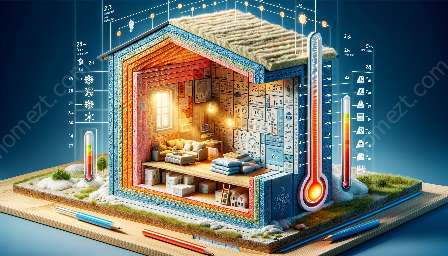When it comes to enhancing energy efficiency in homes, insulation plays a crucial role. This comprehensive guide will explore the importance of insulation for energy efficiency, its impact on home improvement, different types of insulation, effective installation methods, and the numerous benefits it offers.
The Importance of Insulation
Insulation is a key component of maintaining a comfortable indoor environment while minimizing energy consumption. By forming a barrier against heat flow, insulation reduces the need for excessive heating or cooling, thereby lowering energy costs and environmental impact. Additionally, insulation helps regulate indoor temperature, making the home more comfortable throughout the year.
Types of Insulation
There are various types of insulation available, each with unique characteristics and suitable applications. Common types include:
- Fiberglass Insulation: Made from glass fibers, this type is widely used for its affordability and versatility.
- Cellulose Insulation: Composed of recycled paper and treated for fire resistance, cellulose insulation is an eco-friendly option.
- Spray Foam Insulation: This expanding foam provides excellent sealing and is ideal for filling gaps and crevices.
- Mineral Wool Insulation: Constructed from molten glass or stone, mineral wool offers superior fire resistance and soundproofing.
- Rigid Foam Insulation: Offering high insulating value, rigid foam boards are commonly used in exterior walls and roofs.
Effective Installation Methods
Proper installation is critical to the performance of insulation. Depending on the type of insulation, installation methods may vary. It's important to consult with professionals or follow manufacturer guidelines to ensure correct installation and maximize energy efficiency.
Enhancing Home Improvement
Installing or upgrading insulation can significantly enhance home improvement efforts. Beyond energy efficiency, insulation contributes to better indoor air quality, noise reduction, and increased overall comfort. Furthermore, it adds value to the property and improves its desirability in the real estate market.
The Benefits of Insulation
Insulation offers a wide range of benefits, including:
- Energy Savings: Reduced energy consumption leads to lower utility bills.
- Environmental Impact: Lower energy usage contributes to a more sustainable living environment.
- Comfort and Health: Consistent indoor temperatures and improved air quality support overall well-being.
- Noise Reduction: Insulation helps minimize external noise for a quieter living space.
- Property Value: Upgraded insulation enhances the overall value of the home.
Whether considering a new construction project, renovation, or simply aiming to improve energy efficiency, understanding the importance of insulation and its impact on home improvement is essential. By choosing the right type of insulation and ensuring proper installation, homeowners can optimize their living spaces for enhanced comfort, cost savings, and environmental sustainability.





















